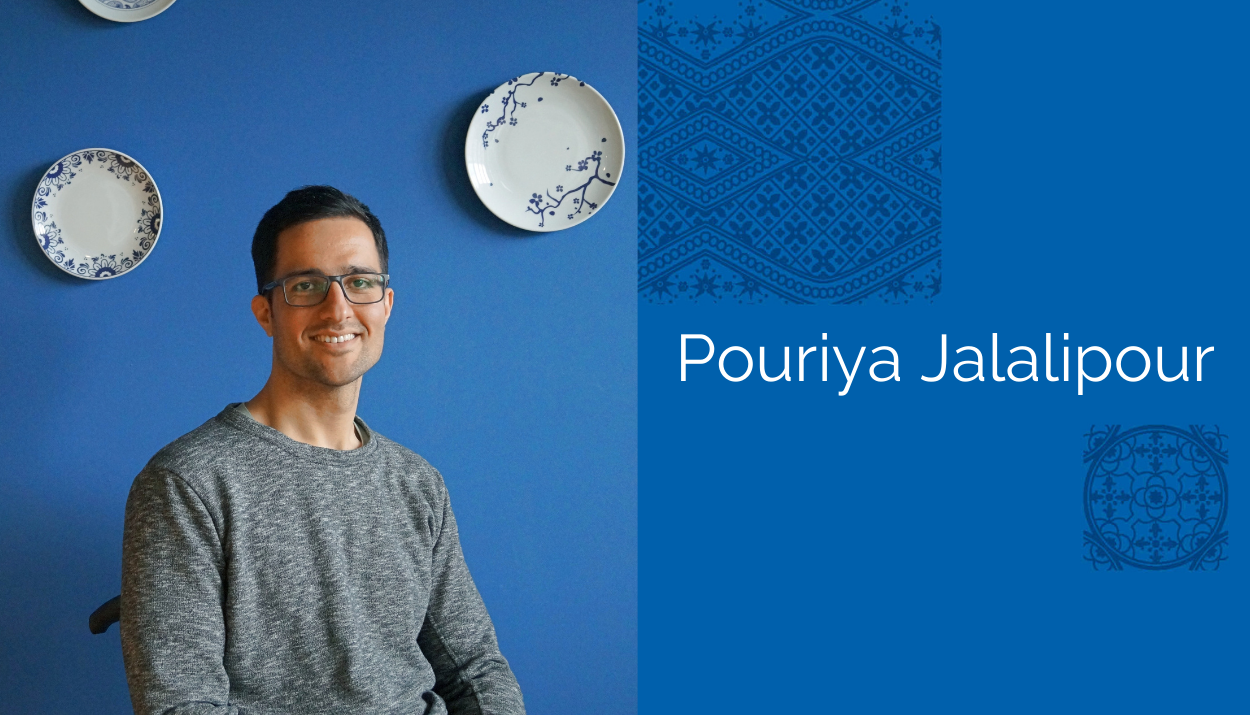"I would like to compete in archery for the Netherlands"
20 may 2021
He played professional basketball until he ended up in a wheelchair, following a motorcycle accident. He adapted and switched to archery. He was also successful in that discipline, and was a member of the Iranian National Archery Team that finished fourth at the 2019 World Championships in Den Bosch. It was a turning point in his life, because he decided to stay in the Netherlands and build a life here. Time for a good chat with Pouriya Jalalipour (32).
Most STE students planned to come to the Netherlands to build a life here. Things went differently for you. Can you tell us why?
"Top athletes in Iran are expected to be politically active. I always tried to avoid that, but at a certain point the situation became untenable. During the World Cup in Den Bosch, I came into conflict with my coach about my brother's wife, who was sitting in the stands without a head covering. Then, I received signals that it would be unsafe for me to return to Iran, so I decided to stay here.”
What was your first impression of the Netherlands?
"The people are very friendly. I'm in a wheelchair and alone, but everyone wants to help me."
How did you discover STE Languages?
"A friend of mine took language training here three years ago. That went well and so he referred me to STE. It is also close to home, which made the choice even easier."
You have been doing Dutch language training for a month now. How is it going?
"It's a difficult language, but fun to learn. I like to take on challenges and this is one for sure. Learning Dutch requires patience, but I learned that through my accident. It takes time to accept a spinal cord injury, which is not easy. Learning a foreign language also takes time.”
You are learning in a group. How does that work?
“Fine! The teachers are friendly and patient. They take time to explain everything well. Training in a group is pleasant, because I am a social person and I enjoy getting to know new people. For example, I have a classmate from Cameroon who has taught me a lot about his country, cuisine and culture. I find that interesting."
That will be familiar to many students, because STE is an excellent place for different cultures to meet and learn from each other. What are you going to share with your classmates?
"Shortly, I will be giving a presentation about my life and my country. Iran is beautiful and has an ancient culture. I would like to tell you more about that. For example, did you know that King Cyrus created the “Cyrus Cylinder”, later recognised as the first declaration of human rights? That was 2,500 years ago!"
Why is it important, for you, to learn Dutch?
"I can make myself understood in English, but it is not the local language. It just doesn’t always work that well. For example, last week my shower chair was broken. I tried to arrange a mechanic through the housing association in English, but that didn't work. Then, my coach called in Dutch and a mechanic was on the doorstep within a day. Everything is just easier when you speak the local language."
Do you also use Dutch outside the classroom?
“Oh yes. I try to speak Dutch everywhere. My coach encourages that as well. The more you practice, the better it gets."
What are your personal goals, both at STE and beyond?
"I have a Bachelor's Degree in software engineering from the University of Tehran. I hope to find work in IT, and I also want to continue to develop as an archer. I hope to represent the Netherlands in archery, one day. As with archery, there are many English terms in IT, but I still prefer Dutch. I want to learn to speak like a native and that will help me build my life here."
What is your favorite Dutch word?
“Lekker! Because I love good food and to cook. In Iran my mother took care of me, but here I have to do everything myself. So, I learned to cook. Often Iranian, but also other cooking cultures such as Italian.
Finally, do you want to share something with your fellow students?
"Learning Dutch helps you to live a comfortable life and to communicate well. You need patience for that, but it's all worth it. That does not only apply to language training. Be patient and grateful, because things can happen that will completely change your life.”


